
Becoming a pesticide handler requires a combination of knowledge, skills, and dedication to ensure the responsible and safe application of pesticides in various settings. Pesticide handlers play a crucial role in protecting crops, managing pests, and maintaining a healthy environment. This guide aims to outline the steps and essential aspects of becoming a pesticide handler.
Introduction
This comprehensive guide is designed to walk you through the essential steps and considerations necessary to become a skilled and responsible pesticide handler. Whether you are an aspiring agriculture enthusiast or someone considering a career change, this guide will provide insights into the educational, experiential, and regulatory aspects of the profession, ensuring that you’re well-prepared to tackle the challenges and responsibilities that come with the role.
Who Is a Pesticide Handler?
A pesticide handler is an individual responsible for the application of pesticides to control or eliminate pests in various settings, primarily in agriculture. This role involves a range of tasks, including mixing and preparing pesticide solutions, operating application equipment, and ensuring that pesticides are applied in accordance with safety guidelines and regulations. Pesticide handlers play a crucial role in protecting crops from pests that can damage or destroy yields, impacting agricultural productivity.
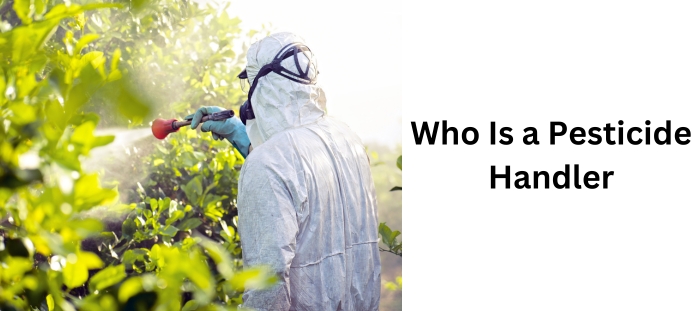
The responsibilities of a pesticide handler extend beyond the application process. Handlers are also accountable for understanding and adhering to local, state, and federal regulations governing the use of pesticides. This includes proper storage, disposal, and documentation procedures to minimize environmental impact and ensure compliance with the law. Additionally, pesticide handlers must prioritize safety by using personal protective equipment (PPE) and following established protocols to minimize the risk of exposure to potentially harmful chemicals.
In essence, a pesticide handler is a skilled professional who combines knowledge of agriculture, biology, and safety regulations to contribute to effective pest management while promoting environmental sustainability and crop health.
What Are the Roles and Responsibilities a Pesticide Handler?
A pesticide handler plays a pivotal role in pest management within the realm of agriculture. Their responsibilities encompass a diverse range of tasks aimed at ensuring the effective and safe application of pesticides. Here are the key roles and responsibilities of a pesticide handler:
1. Pesticide Application
- Mix and prepare pesticide solutions according to specified formulations.
- Calibrate and operate application equipment, such as sprayers or dusters, to apply pesticides accurately.
- Apply pesticides to crops, fields, or target areas in a manner that effectively controls pests while minimizing environmental impact.
2. Safety Compliance
- Adhere to safety protocols and guidelines to minimize the risk of exposure to pesticides.
- Use personal protective equipment (PPE), including gloves, goggles, masks, and appropriate clothing, to ensure personal safety.
- Implement and promote safe handling practices to prevent accidents and protect the handler, bystanders, and the environment.
3. Regulatory Compliance
- Stay informed about and comply with local, state, and federal regulations governing the use of pesticides.
- Understand and follow proper storage, transportation, and disposal procedures for pesticides to ensure regulatory compliance.
4. Documentation
- Maintain accurate records of pesticide use, including application dates, types of pesticides used, and application rates.
- Complete required documentation to demonstrate compliance with regulatory requirements and facilitate traceability.
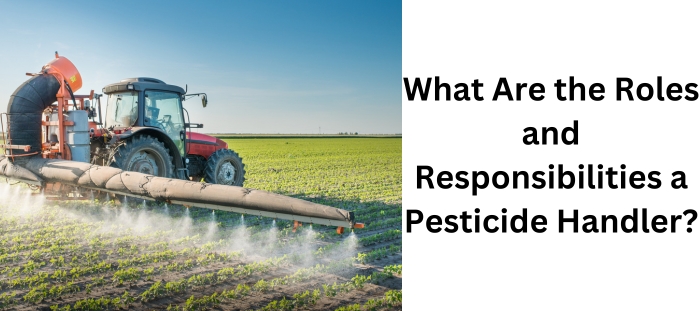
5. Environmental Stewardship
- Minimize environmental impact by following best management practices for pesticide application.
- Consider alternative pest control methods and integrated pest management (IPM) strategies to reduce reliance on chemical pesticides.
6. Education and Communication
- Communicate with farmers, landowners, or clients to understand specific pest control needs and concerns.
- Educate others, including agricultural workers and the public, about safe pesticide handling practices and the potential environmental impacts of pesticide use.
7. Equipment Maintenance
- Perform regular maintenance and inspection of pesticide application equipment to ensure proper functioning and avoid equipment-related issues during application.
8. Continuous Learning
- Stay informed about advancements in pesticide technology, safety practices, and pest management strategies through ongoing education and training.
Benefits of Working as a Pesticide Handler
Working as a pesticide handler offers a range of benefits, starting with the direct impact on agricultural productivity. Pesticide handlers play a pivotal role in preserving crop health and ensuring abundant yields, contributing significantly to global food security. Witnessing the tangible results of their efforts in maintaining thriving agricultural landscapes provides a strong sense of purpose and accomplishment, making the work of pesticide handlers inherently rewarding.
Moreover, pesticide handlers actively engage in promoting environmental sustainability. While pest management is a necessity, handlers adhere to strict safety protocols and best practices, minimizing the environmental impact of pesticide use. By staying informed about integrated pest management strategies and adopting sustainable approaches, handlers contribute to the preservation of ecosystems, striking a balance between effective pest control and ecological well-being. The commitment to environmentally responsible practices adds depth to the meaningful nature of a pesticide handler’s role.
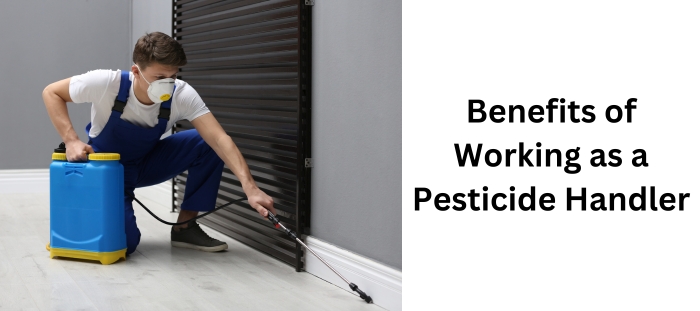
Additionally, a career as a pesticide handler encourages continuous learning and professional development. Given the dynamic nature of pest management, handlers are motivated to stay updated on new technologies, regulations, and safety measures. This commitment not only enhances their skills and knowledge but also keeps them at the forefront of advancements in the field. The combination of hands-on experience and the pursuit of ongoing education makes the work intellectually stimulating and ensures that pesticide handlers remain adaptable and well-prepared for the challenges of their profession. Overall, the benefits of working as a pesticide handler extend beyond job responsibilities, encompassing personal satisfaction, environmental stewardship, and continual professional growth.
Types of Pesticide Handler
Pesticide handlers can be categorized based on their specific roles and responsibilities within the broader field of pest management. Here are different types of pesticide handlers, each with its unique focus and expertise:
1. Agricultural Pesticide Applicators
These handlers specialize in applying pesticides to crops in agricultural settings. They play a crucial role in protecting crops from pests that can damage or reduce yields. Agricultural pesticide applicators must have a deep understanding of crop biology, pest life cycles, and effective application techniques.
2. Public Health Pesticide Applicators
Focused on controlling pests that pose risks to public health, these handlers work in urban and suburban areas. They may be involved in mosquito control programs, managing vector-borne diseases, and ensuring public spaces are safe from harmful pests.
3. Structural Pesticide Applicators
Handlers in this category specialize in pest control within structures such as homes, offices, and commercial buildings. They address issues like termites, rodents, and other pests that can affect the structural integrity and safety of buildings.
4. Landscape Pesticide Applicators
Responsible for managing pests in outdoor landscapes, parks, golf courses, and other recreational areas, landscape pesticide applicators focus on preserving the aesthetic appeal and health of green spaces. They may address issues like turf diseases, weeds, and invasive insects.
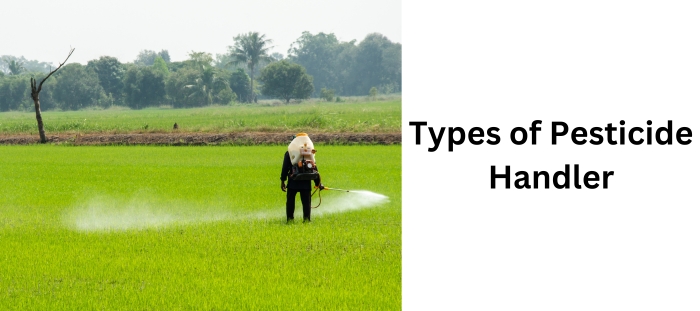
5. Forestry Pesticide Applicators
Operating in forested areas, forestry pesticide applicators contribute to the management of pests that can harm trees and impact forest ecosystems. They play a vital role in maintaining the health of forests and preventing the spread of invasive species.
6. Specialized Pest Control Technicians
Some pesticide handlers specialize in specific types of pests or unique environments. For example, handlers may focus on controlling pests in nurseries, greenhouse settings, or specialty crops.
7. Research and Development Specialists
Engaged in the development and testing of new pesticides, these handlers work in research and development roles. They contribute to advancements in pest management technologies and sustainable solutions.
8. Integrated Pest Management (IPM) Coordinators
Professionals in this category focus on implementing integrated pest management strategies, which involve a holistic approach to pest control. They may coordinate efforts to combine biological, cultural, and chemical control methods to minimize the impact of pesticides.
How to Become a Pesticide Handler?
Becoming a pesticide handler involves a series of steps that encompass education, practical experience, certification, and a commitment to safety and environmental stewardship. Here’s a step-by-step guide on how to become a pesticide handler:
1. Understand the Role
Begin by gaining a clear understanding of the responsibilities of a pesticide handler. Familiarize yourself with the basics of pesticide application, safety protocols, and environmental considerations.
2. Educational Background
While a formal education may not be mandatory, having a foundational knowledge of agriculture, biology, or a related field can be beneficial. Consider taking relevant courses or workshops that cover pesticide application techniques, safety measures, and environmental impacts.
3. Hands-On Experience
Gain practical experience by working with experienced pesticide handlers. Seek internships or entry-level positions that allow you to apply theoretical knowledge in real-world settings. Practical experience is crucial for developing the necessary skills and becoming familiar with various pesticides and application methods.
4. Regulatory Knowledge
Familiarize yourself with local, state, and federal regulations governing the use of pesticides. Understand proper storage, disposal, and documentation procedures to ensure compliance with the law.
5. Certification
Most regions require pesticide handlers to obtain certification before they can legally handle and apply pesticides. Prepare for and pass the certification exam, which typically assesses knowledge of pesticide safety, regulations, and application methods. Certification is usually valid for a specified period, and handlers may need to undergo additional training to renew it.
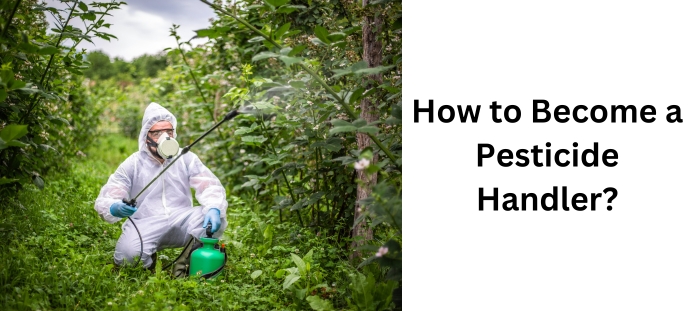
6. Personal Protective Equipment (PPE)
Invest in the necessary personal protective equipment, including gloves, goggles, masks, and appropriate clothing. Prioritize safety to minimize the risk of exposure to pesticides during application.
7. Stay Informed and Continuous Learning
Keep abreast of developments in the field by participating in workshops, attending conferences, and staying informed about new technologies and best practices. Continuous learning ensures that you stay current with evolving pest management strategies.
8. Environmental Considerations
Understand the environmental impact of pesticide use and explore integrated pest management (IPM) strategies. Consider alternative pest control methods to minimize reliance on chemical pesticides and contribute to environmental sustainability.
9. Networking
Connect with professionals in the field, attend industry events, and join relevant associations or organizations. Networking provides opportunities to learn from experienced handlers, stay informed about industry trends, and explore potential career paths.
10. Career Specialization
Consider specializing in a specific area of pest management, such as agriculture, public health, or forestry, based on personal interests and career goals. Specialization allows you to tailor your expertise to specific industries or environmental settings.
Summary
Becoming a pesticide handler involves a combination of education, hands-on experience, and a commitment to safety and environmental stewardship. By following these steps and staying informed, you can embark on a rewarding career as a pesticide handler, contributing to the effective and responsible management of pests in agriculture and other settings.


